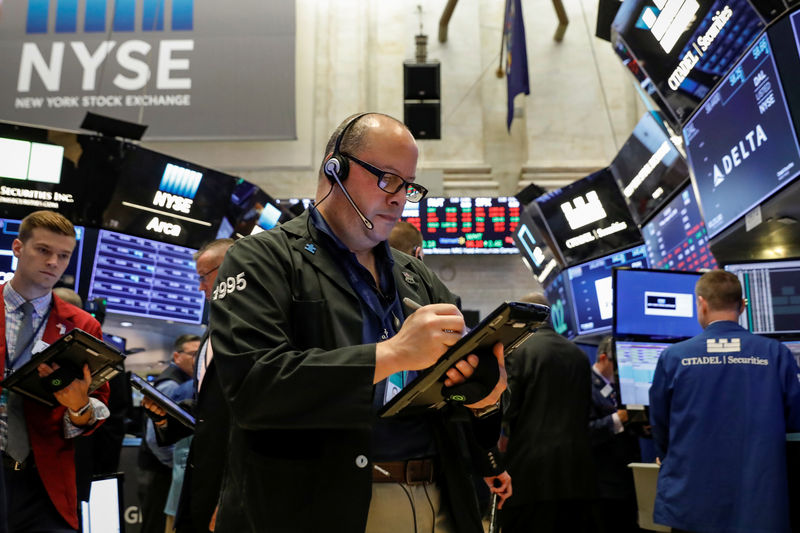By Trevor Hunnicutt
NEW YORK (Reuters) - Signs of movement in the U.S.-China trade stand-off and a rate hike in emerging market trouble spot Turkey sent an index of global stocks higher on Thursday as risk appetite returned.
Wall Street (N) opened higher, following broad gains in Europe (EU) and Asia's major markets (SS), after news that U.S. President Donald Trump's administration had put out feelers to Beijing for a new round of trade talks.
Turkey's central bank also made a rare show of independence, ignoring a fresh bashing from President Tayyip Erdogan and jacking up its interest rates by more than one-third to 24 percent.
MSCI's 47-country world index rose for a fourth straight day of gains, gaining 0.72 percent.
The pan-European FTSEurofirst 300 index rose 0.22 percent, while MSCI's broad emerging market stock index leapt 1.56 percent.
The Dow Jones Industrial Average rose 177.48 points, or 0.68 percent, to 26,176.4, the S&P 500 gained 16.18 points, or 0.56 percent, to 2,905.1 and the Nasdaq Composite added 68.69 points, or 0.86 percent, to 8,022.92.
"There have been a lot of obvious headwinds to risk appetite over the summer," said State Street Global Markets' head of global macro strategy, Michael Metcalfe.
"I just get the sense this week we are beginning to see some light through the clouds."
Washington's invitation for trade talks received a thumbs-up from Beijing. Trump had earlier threatened to impose tariffs on practically all imports from China unless the country offered concessions.
The dollar, which has been a safe haven from trade disputes, fell 0.31 percent against a basket of other major currencies.
U.S. consumer prices rose less than expected in August as increases in gasoline and rents were offset by declines in healthcare and apparel costs, and underlying inflation pressures also appeared to be slowing, data showed on Thursday.
A slackening of inflation could slow the Federal Reserve's pace of rate hikes, and U.S. bond yields fell to session lows after the release of the consumer price report, before rebounding. Benchmark 10-year notes dropped 1/32 in price to yield 2.9645 percent, compared with 2.963 percent late on Wednesday.
The euro rose 0.54 percent to $1.1687. European Central Bank President Mario Draghi said the strength of the European economy continues to support confidence but added that inflation is likely to hover at current levels. The ECB kept its rates deep in negative territory as expected.
The day's big move in currency markets occurred in Turkey's lira. It fell 3 percent after Erdogan called for rate cuts and then surged to be up 3 percent on the day when those calls were ignored.
The lira's rally comes after a more than 40 percent slump against the dollar this year, caused in part by a diplomatic disagreement between Ankara and Washington.
Inflation in Turkey is now almost 20 percent and the crisis there has spread to some other emerging market countries with weak economic fundamentals, such as sizable current account deficits.
"Hiking today does get Turkey on the slow road to recovering some monetary policy credibility, and that is critical," said Aberdeen Standard Investments head of emerging market debt Brett Diment.
"If they hadn't hiked today then the real risk was that the lira would sell off sharply again and the country would swiftly head towards a balance of payments and even a banking crisis."
The lira traded at 6.16 per dollar, well off its record low of 7.24 reached a month ago.
Among commodities, oil prices fell on doubts about growth of demand for fuel, reversing some of the strong gains from the previous session.
U.S. crude dropped 1.02 percent to $69.65 per barrel and Brent was last at $79.19, down 0.69 percent on the day. [O/R]
Graphic: Turkey's real effective exchange rate - https://reut.rs/2p0Vm7L
Graphic: Global currencies vs. dollar - http://tmsnrt.rs/2egbfVh
Graphic: Emerging markets in 2018 - http://tmsnrt.rs/2ihRugV
Graphic: Global assets in 2018 - http://tmsnrt.rs/2jvdmXl

Graphic: MSCI All Country World Index Market Cap - http://tmsnrt.rs/2EmTD6j